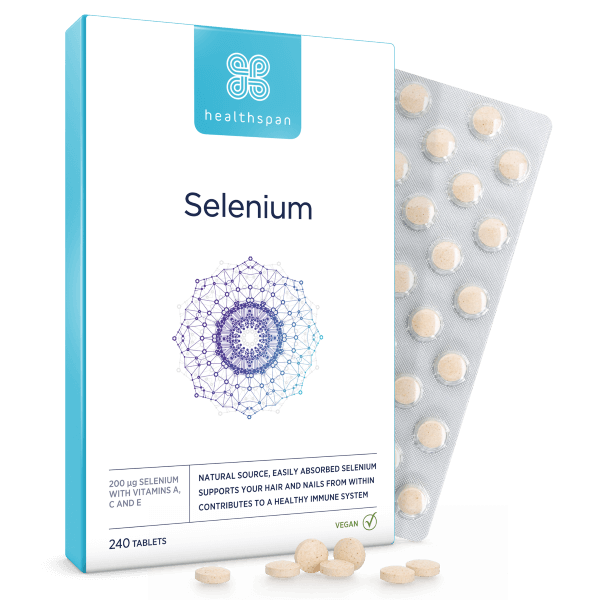This important trace element plays a vital role in immunity.
🕒 2 min read
Selenium is one of the most important trace elements, as it forms part of selenocysteine, an amino acid that is found in at least 25 human proteins.
It is especially important for making a group of powerful antioxidants called selenoenzymes. The best source of dietary selenium is Brazil nuts, and small amounts are also found in fish, poultry, meats, wholegrains, mushrooms, onions, garlic, broccoli and cabbage.
How does selenium work?
Selenium is needed for normal cell growth and immunity. It helps to protect against a wide variety of degenerative issues, such as hardening and furring of the arteries, heart attack and stroke, as well as arthritis, cataracts and thyroid problems.
What can it help?
Immunity
Selenium stimulates the production of natural killer (NK) cells, which fight viral and bacterial infections. Selenium also interferes with viral reproduction. Even relatively harmless viruses can become more virulent on passing through someone with a selenium deficiency, partly because lack of selenium reduces the activity of T-lymphocytes and decreases antibody production.
This makes it more likely that a viral infection will survive long enough for more virulent mutations to occur. This may help to explain why many influenza viruses appear to originate in parts of the world where selenium levels are low.
Thyroid health
Selenoenzymes are needed to regulate the production of thyroid hormones, and the thyroid gland has the highest concentration of selenium in the body. Selenoenzymes help to neutralise the free radicals produced within thyroid cells, as a result of their unique metabolism, to protect the thyroid from damage.
How much should I take?
The EU nutrient reference intake for selenium is 55mcg. Although diet should always come first, selenium was leached out of the soil during the last ice age in many parts of Europe, including the UK.
As the mineral content of food depends on the soil in which it is grown, lack of selenium is an increasing cause for concern. The National Diet and Nutrition Survey shows that one in two females and one in four males have total selenium intakes beneath even the lower reference nutrient intake of 40mcg a day, which is the minimum amount needed to prevent deficiency symptoms.
Available forms
The best-quality supplements contain selenium-enriched yeasts, which provide selenium in a body-ready form.
Perfect partners
Other antioxidants, such as vitamins A, C and E.
Watchpoints
Do not exceed manufacturers' stated doses, as excessive intakes can cause toxicity.

Selenium
Supports thyroid, immunity, hair, skin and nails
- 200mcg natural selenium (363% NRV) per tablet
- Added vitamins A, C and E
- Health support for just over 6p a day






